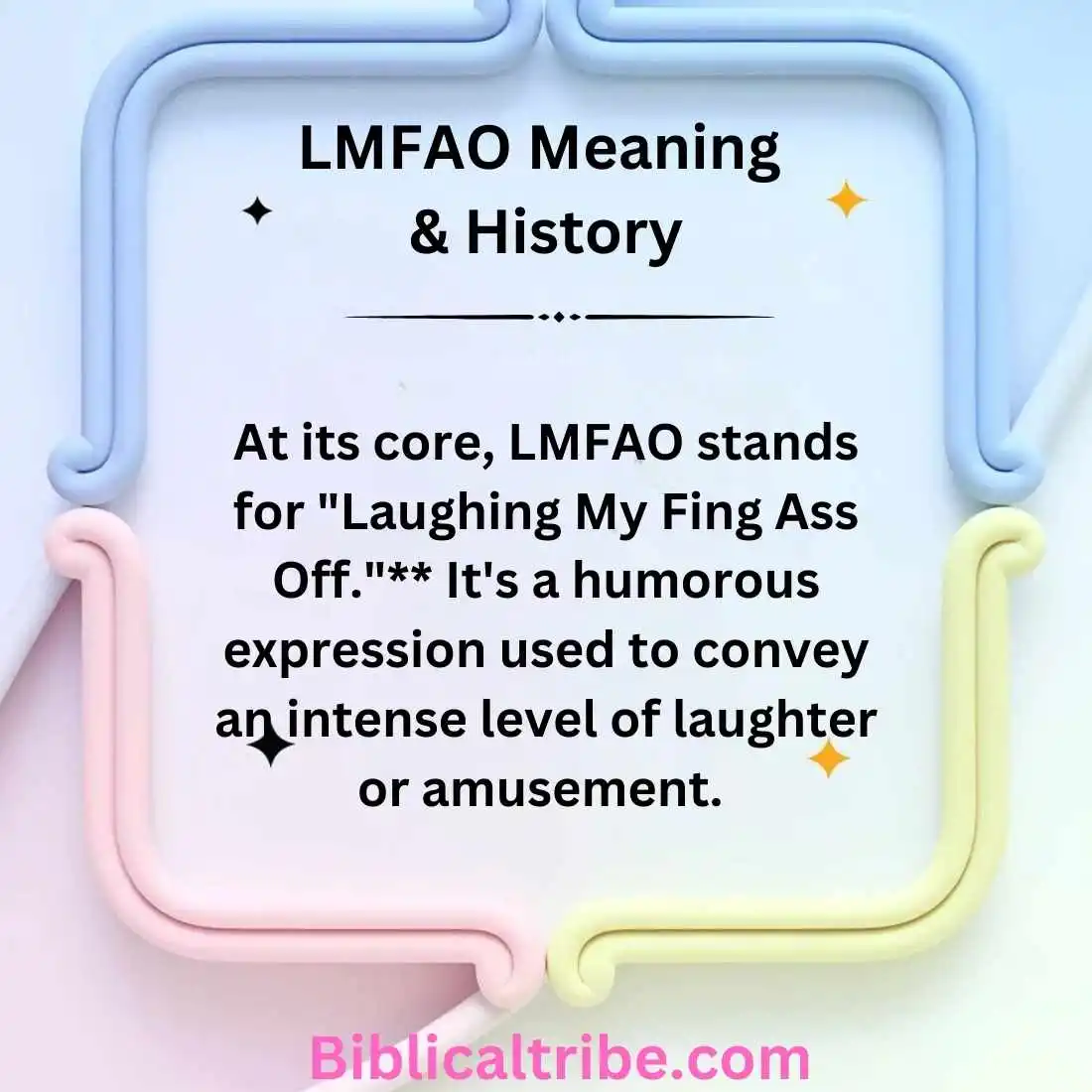Last Updated on February 2, 2025 by Ethan Richards
Have you ever seen LMFAO pop up in a text or social media post and wondered where it came from?
This popular internet acronym has been a staple of online communication for years, adding humor and emphasis to digital conversations.
But what does LMFAO really mean, and how did it evolve into such a widely used expression?
In this article, we’ll dive into the meaning, history, and cultural impact of LMFAO. From its origins in early internet slang to its role in modern messaging, you’ll discover how this acronym has shaped digital expression over time.
Whether you’re a longtime user or just curious about internet lingo, this guide will give you everything you need to know.
Let’s explore the evolution of LMFAO and uncover its significance in today’s online world! 🚀
Have you ever seen LMFAO pop up in a text or social media post and wondered where it came from?
This popular internet acronym has been a staple of online communication for years, adding humor and emphasis to digital conversations.
But what does LMFAO really mean, and how did it evolve into such a widely used expression?
In this article, we’ll dive into the meaning, history, and cultural impact of LMFAO. From its origins in early internet slang to its role in modern messaging, you’ll discover how this acronym has shaped digital expression over time.
Whether you’re a longtime user or just curious about internet lingo, this guide will give you everything you need to know.
Let’s explore the evolution of LMFAO and uncover its significance in today’s online world! 🚀
What Does LMFAO Mean?
At its core, LMFAO stands for “Laughing My Fing Ass Off.”** It’s a humorous expression used to convey an intense level of laughter or amusement.
It’s an evolution of the simpler LMAO (Laughing My Ass Off), with an added emphasis through the use of the word “f**ing.” This added intensity helps convey the magnitude of laughter, making it clear that something is exceptionally funny.
When used in conversation, LMFAO typically expresses a reaction to something extremely funny or entertaining.
Whether it’s a joke, meme, or a hilarious video, using LMFAO lets the other person know that you’re really enjoying the content.
In everyday conversation, LMFAO can be typed out, used as an acronym in text messages, or even said aloud in spoken communication, though the written form is more common.
It often appears as part of the fast-paced, informal language people use on social media platforms like Twitter, Instagram, TikTok, or in texting.
The Origins of LMFAO
The history of LMFAO can be traced back to the early days of internet communication.
In the late 1990s and early 2000s, when people began communicating online via forums and chat rooms, a new set of acronyms and abbreviations emerged as a way to simplify typing and convey emotions quickly.
- Acronyms like LOL (Laughing Out Loud) and ROFL (Rolling on the Floor Laughing) were commonly used during this time, but LMFAO added an extra layer of humor and intensity. It became especially popular when people began looking for ways to express extreme laughter, especially in response to memes, viral videos, and funny content shared across platforms.
- Forums and early social networks, including MySpace and AOL Instant Messenger (AIM), saw the widespread use of LMFAO, which helped it gain momentum in mainstream online culture.
The Role of Internet Humor
Humor on the internet is fast, exaggerated, and often based on inside jokes or shared experiences within communities.
This makes LMFAO an ideal term for communicating just how funny something is without needing to explain it.
In this way, internet humor—and particularly the use of LMFAO—became an essential tool for expressing how things like viral videos, memes, and jokes made people feel.
LMFAO in Popular Culture
Beyond just text messages and casual chats, LMFAO has seeped into popular culture in ways that few internet slang terms have.
The acronym even became synonymous with an entire musical genre thanks to the popular band LMFAO, whose songs like “Party Rock Anthem” and “Sexy and I Know It” brought the acronym into mainstream music.
- LMFAO the band: Formed by Redfoo and SkyBlu, the musical duo LMFAO adopted the name as part of their branding, adding a playful twist to the acronym. Their energetic music, which often features fun, party-centric themes, aligns perfectly with the upbeat and humorous vibe conveyed by the acronym itself.
- In pop culture references: TV shows, movies, and comedy specials began using LMFAO as part of their dialogues. Shows like The Office and Parks and Recreation made references to internet slang like LMFAO, showcasing how widespread it had become in everyday conversations.
- Memes and viral content: The role of LMFAO in meme culture can’t be overstated. Memes that generate laughter often encourage the use of the acronym as a reaction in comment sections, making it a significant part of the digital language.
Similar Acronyms to LMFAO
While LMFAO may be one of the most popular acronyms, it’s not the only one used to express laughter online. Understanding the other similar acronyms can help provide a fuller picture of the language used in online communication.
| Acronym | Full Form | Meaning | Difference from LMFAO |
| LMAO | Laughing My Ass Off | Similar to LMFAO but less intense | Does not contain the word “f***ing” for added emphasis. |
| LOL | Laughing Out Loud | A basic expression of laughter | Used for milder forms of laughter compared to LMFAO. |
| ROFL | Rolling on the Floor Laughing | Extreme laughter, often visual | Suggests a more exaggerated, physical form of laughing. |
| LMK | Let Me Know | A request for information | Used to ask for clarification or a response, not laughter-related. |
How Each Term is Used
- LMAO: While very similar to LMFAO, LMAO lacks the same level of intensity and is often used in more neutral situations.
- LOL: LOL is one of the most basic acronyms for laughing, widely used to convey anything from a small chuckle to a hearty laugh.
- ROFL: This term expresses a higher level of hilarity, often used when something is just too funny to keep composure.
When and Where to Use LMFAO
Knowing when and where to use LMFAO can be a bit tricky. While it’s a casual and humorous expression, it’s important to use it appropriately to ensure that your message is received the way you intend.
- Appropriate Context: Use LMFAO in casual conversations with friends, family, or online acquaintances. It’s perfect for situations when something is truly hilarious, like when watching a funny video or responding to a joke.
- Avoiding Overuse: While LMFAO is fun to use, overusing it can make it lose its impact. It’s important to reserve it for moments of genuine humor.
- Professional Settings: Avoid using LMFAO in formal or professional environments, such as business emails or meetings. It’s too informal and might come across as unprofessional or inappropriate.
- Age and Demographic: Different age groups and communities may use LMFAO differently. Younger people and internet-savvy users are more likely to use it, whereas older generations may not be as familiar with its meaning or usage.
Common Variations of LMFAO
As with any internet slang term, variations of LMFAO have emerged over time. These variants reflect different intensities or modifications based on personal preferences or the need to express emotions in specific ways.
- LMFAOO: Adding an extra “O” in LMFAOO shows even more laughter or excitement. It’s typically used when something is extra hilarious.
- LMAO: A simpler, less intense form of LMFAO, often used for milder laughter.
- ROFL: A more physical expression of laughter, often used to show that something is so funny you’re “rolling on the floor laughing.”
These variations help users tailor their responses based on how funny or ridiculous they find something, creating a more personalized way of communicating emotions.
Why LMFAO is So Popular
There are several reasons LMFAO has become such a popular term:
- Simplicity: It’s a short and simple acronym that communicates an intense emotion with minimal effort.
- Universal Humor: Humor is a universal language. The idea of laughing so hard that you’re “losing your ass” resonates with people of all cultures and backgrounds, making it accessible.
- Digital Communication: The fast-paced nature of digital communication encourages shorthand. LMFAO fits perfectly into this quick style of chatting.
- Social Media Influence: Social platforms like Twitter, Facebook, Instagram, and TikTok have all contributed to the spread and normalization of internet slang. The more people use these platforms, the more slang like LMFAO gets embedded into the language.
Global Usage and Adaptations
While LMFAO originated in the English-speaking world, it has become global slang. As social media networks have crossed cultural boundaries, terms like LMFAO have been adapted and adopted worldwide.
- Localized Versions: In countries like Japan, Korea, and Latin America, LMFAO has been incorporated into local internet slang, often with small tweaks in pronunciation or spelling.
- Cultural Adaptation: In non-English-speaking regions, the core meaning remains the same, but the term might be spelled differently, pronounced differently, or even used alongside local slang.
The Impact of LMFAO on Language Evolution
Language, especially in the digital age, is constantly changing. Acronyms like LMFAO reflect how language is evolving in real-time, especially in informal settings.
- Simplified Communication: Acronyms help streamline communication, allowing people to express complex emotions (like intense laughter) in a single, simple word.
- The Shift to Informality: The widespread use of internet slang, like LMFAO, shows a broader shift toward informality in language. This reflects how digital culture is influencing language norms and how people communicate.
Conclusion
In conclusion, LMFAO is more than just a shorthand for “Laughing My F*ing Ass Off”**. It’s a reflection of how humor, language, and communication have evolved in the age of digital interaction.
From its humble beginnings in internet chat rooms to becoming a global cultural phenomenon, LMFAO is here to stay.
Whether you’re texting your friends, commenting on a meme, or reacting to a funny video, LMFAO helps you express your laughter and adds a fun, exaggerated twist to your communication.
Just remember to use it in the right context, and don’t overdo it!
Now that you know the meaning and history behind LMFAO, go ahead and share it with your friends—and don’t forget to use it when you see something really funny!

Ethan Richards is an accomplished author and dream interpreter known for his insightful and thought-provoking analyses. With a keen eye for detail and a passion for biblical studies, Ethan helps readers unlock the secrets of their dreams, offering clarity and spiritual enlightenment.










